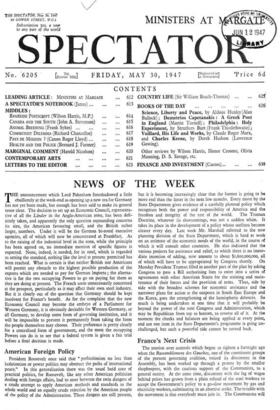NEWS OF THE WEEK
THE announcement which Lord Pakenham foreshadowed a little ebulliently at the week-end as opening up a new era for Germany has not yet been made, but enough has been said to make its general tenor clear. The decision to set up an Economic Council, representa- tive of all the Lander in the Anglo-American zone, has been defi- nitely taken, and apparently the only question outstanding concerns its size, the American favouring small, and the British rather larger, numbers. Under it will be the German bi-zonal executive agencies, all of which will now be concentrated at Frankfurt. As to the raising of the industrial level in the zone, while the principle has been agreed on, no immediate mention of specific figures is expected. None, indeed, is needed, for in steel, which is regarded as setting the standard, nothing like the level at present permitted has been reached. What is certain is that neither British nor Americans will permit any obstacle to the highest possible production of the exports which are needed to pay for German imports ; the alterna- tive is for the two occupying Powers to go on paying for them as they are doing at present. The French seem unnecessarily concerned at the prospect, particularly as it may affect their own steel industry. But it is clearly out of the question that Germany should be kept insolvent for France's benefit. As for the complaint that the new Economic Council may become the embryo of a Parliament for Western Germany, it is obviously desirable for Western Germany, or all Germany, to develop some form of governing institution, and it will be impossible to prevent it permanently from taking the form the people themselves may choose. Their preference is pretty clearly for a centralised form of government, and the most the occupying Powers can do is to see that a federal system is given a fair trial before a final decision is made.


































